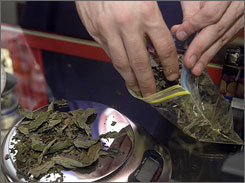Powerful but legal, hallucinogenic under scrutiny
 A little-known hallucinogenic leaf that is legal in most of the USA is the target of new calls for a ban after the suicide of a teenager who smoked it.
A little-known hallucinogenic leaf that is legal in most of the USA is the target of new calls for a ban after the suicide of a teenager who smoked it.Salvia, a relative of flowering sages enjoyed by many gardeners, is the most powerful natural hallucinogen known — almost as strong as LSD, experts say.
Known as "diviner's sage," salvia has been used for centuries by the Mazatec Indians in Mexico. In the USA it is sold in leaf and liquid form by websites and head shops and is available to anyone at any age.
"Kids fall into a false sense of security because it's legal," says state Sen. Karen Peterson, a Delaware Democrat. "We control LSD, and we should control this."
Peterson has filed a bill to make Delaware the third state to designate Salvia divinorum a banned substance like marijuana and heroin. Louisiana and Missouri have already taken such action.
Her action came in response to the suicide of Brett Chidester, 17, of Wilmington, Del., whose family blames the drug.
Brett was a straight-A student who ranked top in his state in Spanish and was making plans for college and to buy his girlfriend roses for Valentine's Day, his family says. On Jan. 23 he put a charcoal grill inside a tent in his father's garage, lit the grill and crawled inside the tent.
A suicide note described revelations that echoed descriptions of salvia experiences posted by users to various salvia-related websites. "How can I go on living after I learned the secrets of life," he wrote. "It took me 17 years, but I finally figured it out. I can't tell you that here because that kind of information can cause chaos."
His mother, Kathleen Chidester, says her son bought salvia on a website. His father, Dennis, says police took salvia from his room. Kathleen Chidester says she believes Brett was depressed and used salvia because it was legal. His suicide note left no doubt in her mind that salvia had something to do with his death.
Despite salvia's powerful nature, the Drug Enforcement Administration has not recommended that it be banned as a dangerous drug. The DEA has been collecting information for years on the leaf, says Rogene Waite, a spokeswoman for DEA. The process involves measuring its availability, potential for abuse and medical uses.
"It is a concern and we're looking at it, but just because it hasn't been scheduled doesn't mean it's safe or healthy," Waite says. "It's dangerous from what you can see from anecdotal material."
Research on salvia has found that it causes depressive symptoms in rats and monkeys and dysphoria — similar to depression — in people. However, some see the potential for beneficial uses.
Daniel Siebert, who sold his T-shirt business years ago to study medicinal plants, has a website where he offers cautionary information about salvia and sells the leaves and their extracts. Siebert says moderate doses help people meditate and gain insight about their inner selves.
The first time Siebert chewed some of the leaves, he says, he had pleasant visions of "fairy-like beings hovering around the hillside" of his home in Malibu, Calif. When he first smoked the more potent extract, however, he experienced an "extreme disembodied state in another universe" that he says was frightening and unpleasant.
He says he favors "some reasonable controls" but opposes a ban.
So does Bryan Roth, director of the Psychoactive Drug Screening Program for the National Institute of Mental Health. The federally funded program looks for new treatments for mental illnesses.
Roth calls Salvia "the world's most potent natural occurring hallucinogen." He is among several researchers who say salvia may prove helpful in treating disease. The plant produces large amounts of salvinorin A, an "extremely potent hallucinogen," nearly as strong as LSD, that targets a single chemical receptor in brain cells, Roth says. The receptor is involved in "consciousness and our perception of reality," and it is located in neurons that have a role in depression, drug abuse and schizophrenia.
"Many teams of chemists around the world are making salvinorin A for research," Roth says.
Criminalizing salvia and its derivatives would make it "almost impossible" to get salvia-related compounds approved for human use, Roth says.
Nevertheless, Ross says, there should be some regulation. "It probably shouldn't be sold over the Internet to unsuspecting teenagers," he says.
Kathleen Chidester would agree.
In an essay she found on Brett's computer after his death, he wrote that the meaning of the universe "is nothing."
"When I read that I thought, 'That's not him talking, that's salvia," Chidester says.
By Oren Dorell
2 Comments:
Criminalizing salvia and its derivatives would make it "almost impossible" to get salvia-related compounds approved for human use, Roth says.
This statement is totally false. The law that was passed in Delaware allows Salvia to be used for research purposes. It was written expressly so if salvia is found to have a useful purpose treating various illnesses it will be available for researchers and scientists to use. Mr. Roth obviously didn't do his research before he made this statement.
I agree this should be banned. My 19 year old son now has a list of mental problems that began with his salvia use. He just came home from a 72 psychiatric hold and he is not much better. I am looking for help from anyone who will listen.
Jonna Hannigan in CA.
Post a Comment
<< Home